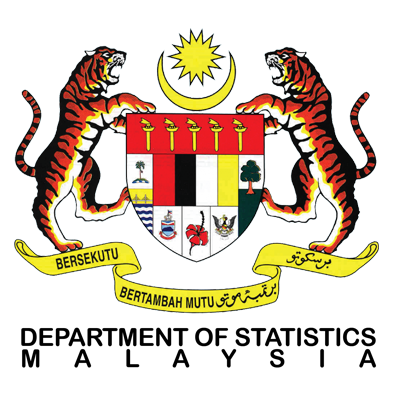Malaysia External Trade Statistics
- Home
- Statistics
- Economy
- External Sector
- Malaysia External Trade Statistics
Malaysia External Trade Statistics March 2019
Malaysia External Trade Statistics February 2019 4 March 2019
Malaysia External Trade Statistics January 2019 30 January 2019
Malaysia External Trade Statistics December 2018 4 January 2019
Malaysia External Trade Statistics November 2018 5 December 2018
Malaysia External Trade Statistics October 2018 5 November 2018
Malaysia External Trade Statistics September 2018 Show all release archives
Overview

KEY FACTS
MONTHLY
- In March 2019, exports decreased marginally 0.5% to RM84.0 billion year-on-years (y-o-y). Re-exports was valued at RM15.2 billion registering a decline of 5.4% y-o-y and accounted for 18.1% of total exports. Domestic exports recorded an increase of 0.7% or RM446.5 million to RM68.8 billion.
- Imports also registered a marginal decrease of 0.1% y-o-y to RM69.7 billion.
- However, on a month-on-month (m-o-m) basis, exports recorded a double-digit growth of 26.2% from RM66.6 billion. In seasonally adjusted terms, exports also rose 7.4%.
- On a m-o-m basis, imports also soared 25.4% or RM14.1 billion from RM55.5 billion. In seasonally adjusted terms, imports also increased 10.5%.
- On a y-o-y basis, exports fell due to the decrease in exports to Singapore (-RM773.6 million), Japan (-RM750.9 million), Hong Kong (-RM725.4 million), the European Union (-RM449.1 million) and Switzerland (-RM421.1 million). However, exports increased to China (+RM1.2 billion), Taiwan (+RM739.9 million) and Thailand (+RM729.9 million).
- On a y-o-y basis, lower imports were mainly from Japan (-RM665.5 million), Indonesia (-RM601.2 million), India (-RM571.8 million),
- Switzerland (-RM570.8 million) and Singapore (-RM564.1 million). Meanwhile, higher imports were from China (+RM1.8 billion), Saudi Arabia (+RM587.2 million) and United States (+RM558.3 million).
QUARTERLY
- In 1st quarter 2019, exports recorded a decline of 0.7% y-o-y to RM236.0 billion. Re-exports was valued at RM43.1 billion decreasing 10.2% y-o-y and accounted for 18.3% of total exports. Domestic exports grew 1.7% to RM192.9 billion from a year ago.
- Imports also registered a decrease of 2.5% y-o-y to RM199.1 billion.
- On a quarter-on-quarter (q-o-q) basis, exports dropped 10.8% from RM264.8 billion.
- On a q-o-q basis, imports declined 13.4% from RM229.9 billion.
- On a y-o-y basis, the decrease in exports was attributed to lower exports to Hong Kong (-RM1.9 billion), Indonesia (-RM1.3 billion), Japan (-RM1.3 billion), Switzerland (-RM1.0 billion) and Turkey (-RM539.3 million). However, exports increased to China (+RM2.0 billion), Taiwan (+RM1.5 billion) and Thailand (+RM1.4 billion).
- On a y-o-y basis, lower imports were mainly from Singapore (-RM3.3 billion), the European Union (-RM1.7 billion), India (-RM1.4 billion), Switzerland (-RM1.3 billion) and Indonesia (-RM891.2 million). Meanwhile, higher imports were from Saudi Arabia (+RM2.4 billion) and China (+RM1.1 billion).
TRADE
Total trade which was valued at RM153.7 billion decreased RM518.6 million or 0.3% in March 2019. However, it grew RM31.6 billion or 25.9% when compared to February 2019. The trade surplus was RM14.4 billion, shrank RM318.5 million (-2.2%) from a year ago. However, it surged 30.0% or RM3.3 billion as compared to the previous month.
EXPORTS
On a y-o-y basis, exports decreased 0.5% to RM84.0 billion. The main products which attributed to the decline were:
- Crude petroleum, which contributed 2.9% to total exports dropped RM1.2 billion or 33.5% to RM2.4 billion due to the decrease in export volume (-35.3%) as average unit value rose 2.7%;
- Palm oil and palm oil-based products (6.5% of total exports), shrank RM618.1 million (-10.2%) to RM5.4 billion. Exports of palm oil, the major commodity in this group of products declined RM505.6 million or 14.1% due to the decrease in both average unit value (-12.8%) and export volume (-1.5%);
- Electrical and electronic (E&E) products (37.2% of total exports), declined RM606.0 million (-1.9%) to RM31.2 billion;
- Timber and timber-based products, which contributed 2.2% to total exports shrank RM63.3 million or 3.3% to RM1.9 billion; and
- Natural rubber (0.4% of total exports) decreased RM43.2 million or 12.4% to RM305.9 million due to the decline in both export volume (-7.6%) and average unit value (-5.1%).
However, the following products recorded an increase:
- Refined petroleum products, which accounted for 5.9% of total exports, rose RM692.8 million or 16.2% to RM5.0 billion due to the increase in both average unit value (+12.7%) and export volume (+3.1%); and
- Liquefied natural gas (LNG), which accounted for 4.6% of total exports grew RM569.1 million or 17.2% to RM3.9 billion due to the increase in both export volume (+10.3%) and average unit value (+6.3%).
On a m-o-m basis, exports rose RM17.4 billion (+26.2%) from RM66.6 billion. The main products which contributed to the growth were:
- Electrical and electronic (E&E) products expanded RM5.4 billion (+21.0%) from RM25.8 billion;
- Refined petroleum products increased RM1.3 billion or 37.1% from RM3.6 billion due to the increase in both export volume (+28.6%) and average unit value (+6.6%);
- LNG, rose RM725.2 million (+23.1%) from RM3.1 billion due to the increase in export volume (+27.9%) as average unit value declined 3.8%;
- Palm oil and palm oil-based products grew RM702.3 million or 14.9% from RM4.7 billion. Exports of palm oil increased RM394.7 million or 14.7% due to the growth in both export volume (+12.3%) and average unit value (+2.1%);
- Timber and timber-based products rose RM505.4 million (+36.7%) from RM1.4 billion;
- Crude petroleum increased RM500.0 million or 26.2% from RM1.9 billion due to the growth in both export volume (+21.2%) and average unit value (+4.2%); and
- Natural rubber recorded a marginal increase of RM72.8 million or 31.2% from RM233.1 million due to the rise in both export volume (+29.6%) and average unit value (+1.3%).
Exports to Country of Destination
The two major destinations for Malaysia’s exports in March 2019 were China and Singapore. Exports to China amounted to RM11.7 billion and increased RM1.2 billion (+11.8%) as compared to the previous year.
The main products which attributed to the rise were:
- E&E products, which contributed 42.0% of total exports surged RM318.5 million (+6.9%) to RM4.9 billion;
- LNG which contributed 4.5% of total exports rose RM166.8 million or 44.7% to RM540.1 million; and
- Timber and timber-based products (1.1% of total exports), grew RM24.4 million (+24.9%) to RM122.6 million.
Exports to Singapore which were valued at RM10.5 billion declined RM773.6 million (-6.9%). The main products which attributed to the decrease were:
- E&E products, which contributed 44.0% of total exports fell RM410.8 million (-8.2%) to RM4.6 billion;
- Refined petroleum products (9.4% of total exports), decreased RM391.4 million or 28.5% to RM979.8 million; and
- Crude petroleum which contributed 3.2% of total exports decreased RM168.8 million or 33.5% to RM335.8 million.
Seasonally Adjusted Figure
On a m-o-m basis seasonally adjusted terms, exports rose RM5.4 billion (+7.4%) to RM79.3 billion.
Exports, 2015-2019

IMPORTS
On a y-o-y basis, imports declined RM100.0 million or 0.1% to RM69.7 billion. The decline in import was mainly attributed to capital goods.
- Capital Goods
Imports of capital goods, which accounted for 11.9% of total imports, dropped RM1.1 billion (-11.8%) to RM8.3 billion due to the decline in both transport equipment, industrial (-RM791.6 million, -45.6%) and capital goods (except transport equipment) (-RM324.5 million, -4.2%).
- Consumption Goods
Imports of consumption goods which constituted for 8.5% of total imports recorded an increase of RM562.3 million (+10.5%) to RM5.9 billion. The growth was mainly attributed to durables (+RM190.9 million, +30.7%), non-durables (+RM181.6 million, +13.7%) and food & beverages, processed, mainly for household consumption (+RM89.1 million, +5.5%).
- Intermediate Goods
These goods which constituted 54.6% of total imports increased RM1.2 billion (+3.2%) to RM38.0 billion. The growth was mainly attributed to fuel & lubricants, primary (+RM842.5 million, +33.7%), parts & accessories of capital goods (except transport equipment) (+RM663.9 million, +5.8%) and food & beverages, primary, mainly for industries (+RM212.9 million, +41.0%). However, industrial supplies, processed decreased RM707.0 million or 4.6%.
On a m-o-m basis, imports surged RM14.1 billion or 25.4% from RM55.5 billion. All main categories of imports by end use recorded increases.
- Intermediate Goods
These goods rose RM6.1 billion (+19.2%) from RM31.9 billion. The main components contributed to the increase were industrial supplies, processed (+RM2.8 billion, +23.2%), parts & accessories of capital goods (except transport equipment) (+RM1.4 billion, +13.1%) and fuel & lubricants processed, others (+RM778.2 million, +81.4%).
- Capital Goods
Imports of capital goods increased RM1.7 billion (+25.8%) from RM6.6 billion due to the increase in both capital goods (except transport equipment) (+RM1.6 billion, +27.2%) and transport equipment, industrial (+RM126.0 million, +15.4%).
- Consumption Goods
Imports of these goods registered an increase of RM1.3 billion (+29.4%) from RM4.6 billion. The increase was due to food & beverages, processed, mainly for household consumption (+RM419.8 million, +32.2%), durables (+RM314.5 million, +63.1%), food & beverages, primary, mainly for household consumption (+RM284.3 million, +50.5%) and non-durables (+RM250.9 million, +20.0%).
Imports by Country of Origin
The two main sources of Malaysia’s import in March 2019 were China and Singapore. Imports from China which registered RM13.8 billion rose RM1.8 billion (+15.1%) when compared to March 2018.
The main products which attributed to the growth were:
- Refined petroleum products (7.3% of total imports), increased RM656.2 million or 191.5% to RM998.9 million;
- E&E products, which contributed 36.7% of total imports grew RM98.2 million or 2.0% to RM5.0 billion;
- Palm oil and palm oil-based products, which accounted for 0.5% of total imports, rose RM29.2 million or 86.2% to RM63.1 million.
Imports from Singapore decreased RM564.1 million (-6.7%) to RM7.8 billion from a year ago. The main products which attributed to the drop were:
- Refined petroleum products (33.9% of total imports), decreased RM259.7 million or 8.9% to RM2.7 billion; and
- E&E products, which contributed 32.5% of total imports fell RM161.0 million (-5.9%) to RM2.5 billion.
Seasonally Adjusted Figure
On a m-o-m basis seasonally adjusted terms, imports increased RM6.6 billion (+10.5%) to RM69.2 billion.
Imports, 2015-2019

MARKET SHARE
The following charts show Malaysia's major trading partners for January - March 2019.
Total Trade by Major Countries, Jan – Mar 2019, percentage share

Exports and Imports by Major Countries, Jan – Mar 2019, percentage share

The following charts show Malaysia’s trade with ASEAN countries for January – March 2019.
Exports, Jan – Mar 2019, percentage share

Imports, Jan – Mar 2019, percentage share

#Notes:
1. The March 2019 data is provisional and subject to revision in later issues.
2. This report can be accessed through the web portal of the Department of Statistics, Malaysia (https://www.dosm.gov.my) under section: Latest Release.
Released By:
DATO' SRI DR. MOHD UZIR MAHIDIN
CHIEF STATISTICIAN MALAYSIA
DEPARTMENT OF STATISTICS, MALAYSIA
![]() DrUzir_Mahidin
DrUzir_Mahidin ![]()
![]() Dr_Uzir
Dr_Uzir
3 MAY 2019
Contact person:
Public Relation Officer
Strategic Communication and International Division
Department of Statistics, Malaysia
Tel : +603-8885 7187 / 7942
Fax : +603-8888 9248
Email : jpbkkp[at]dosm.gov.my
Subscribe
Newsletter
Subscribe to our newsletter and stay updated
For interviews, press statement and clarification to the media, contact:
Baharudin Mohamad
Public Relation Officer
Email: baharudin[at]dosm.gov.my
Phone: 03 8090 4681
Not found what you looking for? Request data from us, through
Go to eStatistik
Email: data[at]dosm.gov.my
Phone: 03 8885 7128 (data request)










